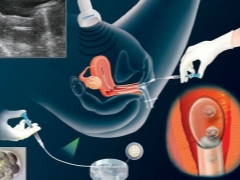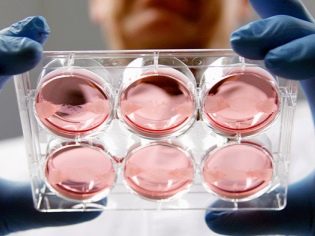Embryo implantation in IVF. How to increase the chances of success?
After embryo transfer into the uterus during IVF, a difficult and disturbing period begins. For at least two weeks, the woman will remain in the unknown - whether the implantation took place, whether the pregnancy began. How is the implantation of a successful IVF, we will tell in this article.
How does this happen?
If the child is conceived naturally, that is, the meeting of the egg with the sperm took place in the fallopian tube, then it can take about a week or a bit more before implantation. Ovum after the connection of its DNA with the DNA of the male germ cell begins to split, turns into a zygote. The zygote moves down to the uterus. She is actively helped by the villi inside the fallopian tube, as well as minor cuts in muscle tissue. By the time the zygote reaches the uterine cavity, it already has a completely new status - this is a blastocyst, which has up to 400 cells.
During the IVF procedure, bred embryos to stasis enter the uterine cavity. The germ cells of a man and a woman are not found in the female body, but in the laboratory under the close supervision of an embryologist. This specialist assesses the rate and speed of crushing zygotes and decides on the timing of the transfer. The reproductologist helps him, prompting when a woman has the best time to transfer, the so-called “implant window”.
As with natural conception, the endometrium of the uterus must be ready to receive the embryo. It should be quite loose, its thickness - increased. In the body of a woman who becomes pregnant naturally, the hormone produced in the body, progesterone, is responsible for preparing the functional inner layer of the uterus for implantation. With IVF, a woman begins to take progesterone beforehand, usually on the same day as the egg puncture, after the procedure.
In the future, the process of implantation after IVF and natural conception is very similar. The task of the blastocyst is to infiltrate the loose endometrium. This process takes place in two stages. At first, the blastocyst simply floats in the uterine cavity. Then adhesion occurs. The fetal egg sticks tightly to the endometrium during this stage. Embryonic membranes begin to secrete some special enzymes, which have no analogues in the woman’s body. These enzymes gradually "dissolve" endometrial cells, which allows the fetal egg to safely "dig" in the tissue of the functional layer of the uterus. This is the second part of the implantation, which is called invasion.
The fertilized egg of an egg communicates with the blood vessels of the endometrium of the uterus with the help of the chorionic villi. So the baby begins to receive oxygen from her mother's blood and useful substances and minerals necessary for growth and development. The chorion itself begins to produce a special hormone - hCG. It is by the concentration of this hormone that pregnancy can be diagnosed, since non-pregnant women do not have this hormone or it is present in extremely low concentrations.
HCG supports the production of progesterone so that the pregnancy can develop further. From the moment of implantation, it is believed that pregnancy has come. True, after IVF, embryos can survive longer than normal conception in a natural way.
Let's consider how long after the procedure of in vitro fertilization usually happens.
When do the replanting?
The exact answer to this question to the woman will not be able to give any doctors. Their task is to choose the best and most favorable time for replanting, what will happen next - it is under the jurisdiction of fate and “higher powers”. Transfer is most often carried out during the implantation window - on the 20-22 day of the cycle. But even here, various variations are possible - it all depends on how ready the endometrium is, as well as on the viability of the embryo.
The average time of implantation after IVF is 6-10 days after the transfer procedure. If the maximum number of favorable circumstances expires, an earlier attachment may occur for 3-4 days, and maybe late implantation - on 11 or even 12 days after the transfer. Everything is very individual.
It is in terms of implantation that the main difference between the natural conception and artificial insemination lies. From the moment the blastocyst enters the uterus during natural conception until its invasion into the functional layer of the reproductive organ, usually no more than 40 hours pass. But embryos introduced into the uterine cavity after the IVF protocol can float freely in the uterus for several days. At two stages of implantation takes at least 3 days.
It is believed that earlier than others, five-day embryos, which grew in the laboratory for five days, begin to implant and settle down. With this transfer, blastocysts, rather than zygotes, are introduced into the uterus, and the process of adhesion can begin within a few hours after transfer. The process can last longer if three-day germ cells are planted.
If the IVF protocol included cryoptransfer (thawed embryos), then usually it takes quite a long time to implant, and it is possible that both stages of the process will take place at a later date.
What does a woman feel?
For the most part, women do not feel anything special with implantation. After IVF, many would be happy to feel at least something, but alas. Implantation is so subtle and jewelery cell process that it is almost impossible to feel it.
The search for signs of implantation or the reasons for their absence in most cases takes up all free time for women who have gone through the IVF protocol. Indeed, sometimes there are symptoms, but mostly, they are noticeable only in women after natural conception. These features include poorly studied medicine implant bleeding.
During invasion of the ovum, the small blood vessels of the endometrium are injured, their integrity is broken. As a result, a small amount of blood is secreted through the genital tract. Implant bleeding is manifested as a bloody spotting. If there is very little blood flow, the discharge may be pinkish or cream. They also end abruptly, as appeared sometimes after a few hours, sometimes within a day.
This characteristic feature is found only in a small number of women. After IVF, the body is influenced by hormones, which were used in the first phase of the cycle to stimulate the ovaries, so many women have brownish or pink secretions. Against the background of such effects of stimulation, it will be quite difficult to consider the signs of implantation bleeding, even if it occurs. If there is no discharge after the transfer, the probability of noticing this feature is higher.
Among the indirect signs of implantation, changes in mood and state of health can be noted. HCG with progesterone has a wide range of actions - a woman can become drowsy or, on the contrary, begin to experience problems with a night's sleep. Some immediately urinate, while others, as if on cue, increase appetite.
However, do not be upset if you have no such symptoms. The overwhelming majority of women do not have any signs or symptoms of implantation or the first weeks after it.
How to affect the probability of a successful outcome?
Any woman who enters the IVF protocol is warned by the medical staff that there is no absolute guarantee of pregnancy. Moreover, the effectiveness of the procedure is much lower than its cost. Successfully completes only 30-35% of the first protocols. That is, implantation will occur and pregnancy will develop in every third woman. With the second protocol, the probability will be higher - 35-45 and even 50%. 3 IVF attempts increase the chances of getting pregnant up to 55-60%.
Knowing this statistics, a woman involuntarily wonders if she can personally increase the chances of success and what depends on herself. If you answer the question honestly and concisely, then nothing. Nothing depends on the woman at this stage, because the chances for a successful implantation consist of several important points:
- how viable were the embryos;
- whether pre-implantation genetic diagnosis was carried out;
- how ready was the endometrium of the uterus for replanting;
- how technically the replanting was carried out;
- okay if hormonal background.
In addition, the age of a woman is important (the younger she is, the higher the chances), her general health, and psychological background. A woman who protects herself from stress, experiences, leads a measured and calm lifestyle is more likely to become a mother on the first attempt.
In addition, it is desirable to follow all the recommendations of the doctor. They are usually arranged in the form of a memo and are handed to the woman after the embryo is transferred to the uterus. The first day or two, it is recommended to lie down, and then you can return to a normal lifestyle, but with significant adjustments. Do not miss the reception of drugs prescribed by a doctor (usually these are vitamins and progesterone preparations). Prohibited sex and masturbation, because orgasm and arousal can cause an increased tone of the uterine muscles, which prevents implantation.
A woman should avoid crowded places where she can become infected with viral infections. Also, you can not take hot baths and swim, lift weights, jump. Compliance with diets is best postponed until other times, to increase the likelihood of getting pregnant, nutrition should be sufficiently high-calorie, rich in protein.
Improving the chances of successful implantation will help the right attitude, in which a woman will remain calm, not to harass themselves and others with tests and questions, whether the long-awaited event took place. The first diagnosis should be carried out not earlier than 14 days after the transfer - it should be a blood test for hCG. If it is positive, then a week later a first confirming ultrasound is done.
Reviews
Most women note that the implantation moment itself passed completely unnoticed. Moreover, those more experienced in IVF issues (having made several attempts) assert that those of the protocols turned out to be successful, after which the women tried to lead a normal life, refused to take the hospital and went to work. The protocols in which they lay and waited for the onset of pregnancy were unsuccessful.
There is medical evidence for this. When lying down for a long time, the blood circulation of the pelvic organs is disturbed and implantation becomes less likely.
In the next issue of the “Just about IVF” cycle of Boris Kamenetsky (AVA-PETER clinic), the doctor answers the most popular questions of the patients in an accessible manner.























